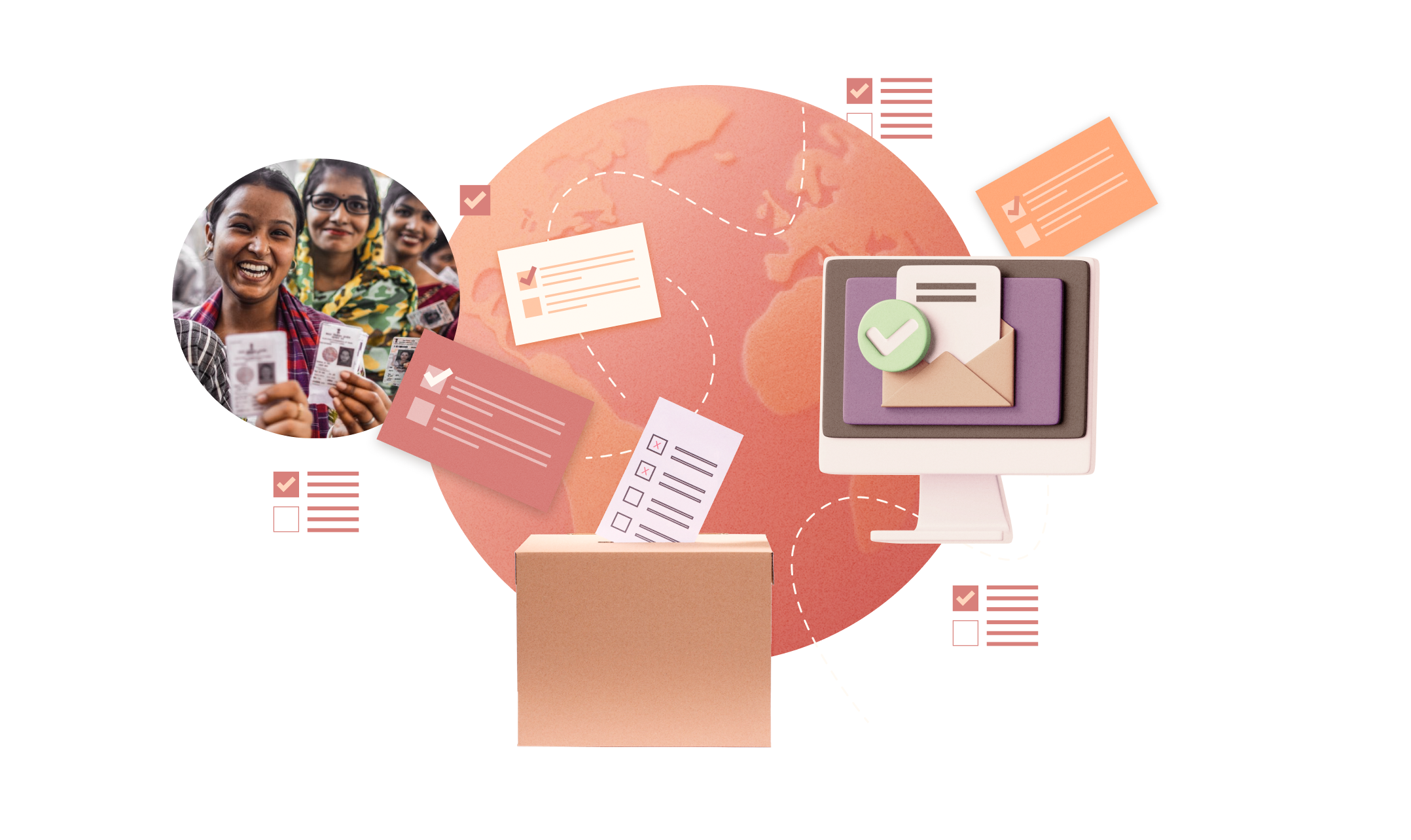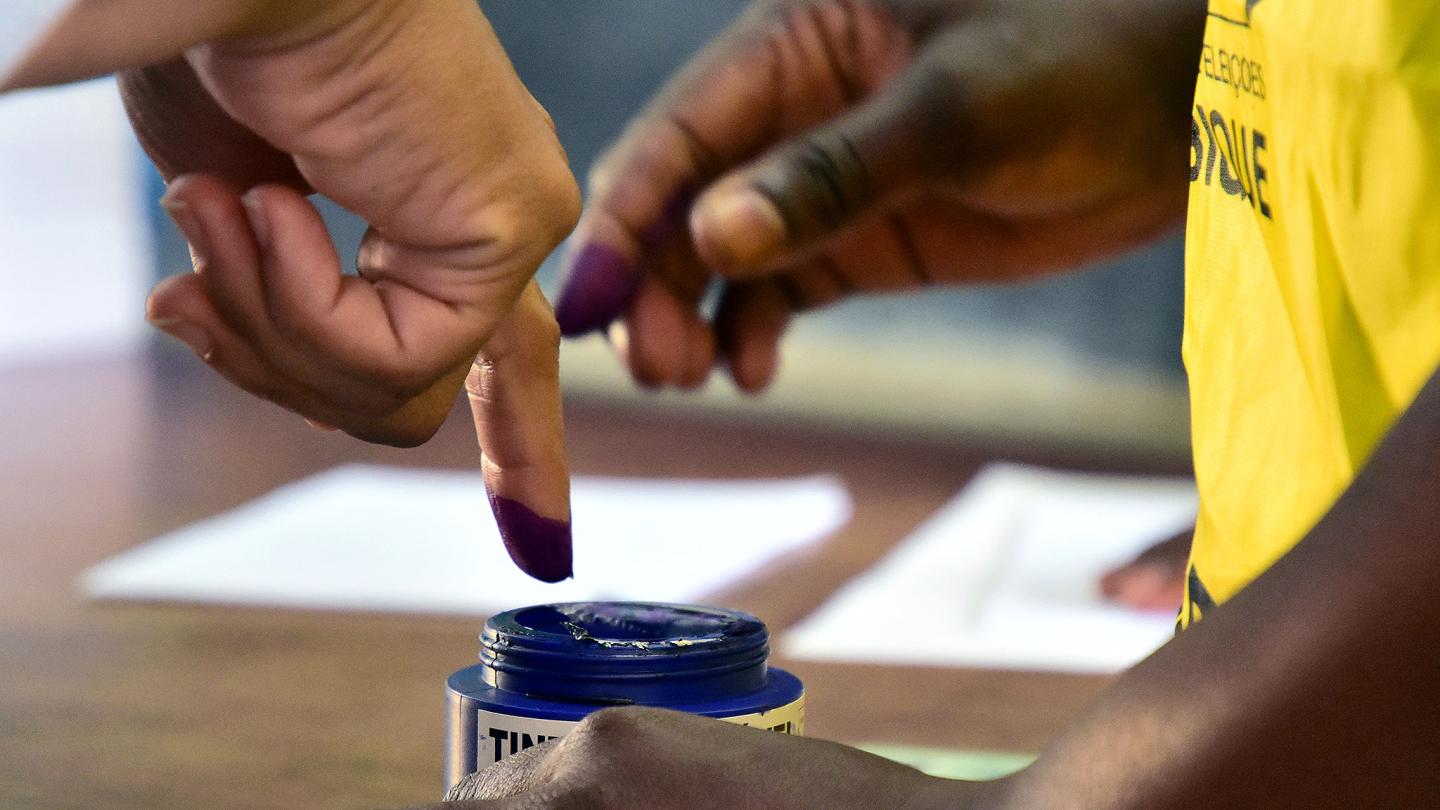A ‘super year’
for elections
3.7 billion voters, 72 countries:
Strengthening democracy and
good governance in 2024
This is the biggest election year in human history. Half of the world’s population – some 3.7 billion people – will have the opportunity to go to the polls in 72 countries.
Many will be voting for the first time.
From South Africa to the South Pacific, to Europe and the Americas, the stakes are immense. Voters will have their say in local and national elections and will determine the political, social and economic landscape of the entire world for years to come.
Yet the billions of people voting this year are living in a vastly unequal world — and when inequality rises, trust in government falls.
One in two people feel that they are not in control of their lives and two out of three people don’t think their voice is heard in the political system.
It is not only that governments and institutions are failing to meet people’s expectations for a better life - distrust is also being fueled by disinformation, extreme polarization and shrinking civic spaces.
Addressing these issues requires more than a decision in the voting booth. It means countries investing in governance systems which ensure everyone has a voice, where needs are met and rights are protected.
“Resilient democracies require good governance, which cannot be created overnight but is built on accountable social and political institutions, with norms, values and a culture based on respect for human rights.”– Marcos Neto, UN Assistant Secretary-General and Director of the UNDP Bureau for Policy and Programme Support
The global picture
In an era marked by unprecedented challenges – from climate change to conflict to poverty – all countries and their governance systems are being tested. Robust governance systems, from global to local, are societies’ best defence.
On the other hand, governance systems that foster exclusion, political polarity and discrimination obstruct efforts to end poverty, protect the planet and improve lives. They are a roadblock to achieving the Sustainable Development Goals (SDGs).
For decades UNDP has been working with countries to strengthen democratic processes, provide electoral assistance, advance women’s participation in politics, and challenge misinformation and disinformation.
Our goal, already well underway, is to support 800 million voters participate in elections, many for the first time, between 2022 and 2025.
With the United Nations Department of Economic and Social Affairs, we have launched the FutureGov initiative, which works with the public sector to achieve the SDGs and better respond to citizens’ needs.
It reflects our commitment to supporting democratic legitimacy, representation and inclusivity, government accountability, civic engagement and public participation.
This work, always a large part of our mission, is more vital than ever.


In Peru, where nearly 4 million people speak Quechua as their first language, bilingual election information contributed to an 80% voter turnout in the 2023 municipal elections.
Making elections matter
The relationship between democracy and inclusive development is a global one, not unique to one country, or region.
Globally, people want – and are dissatisfied with – democracy. UNDP’s Human Development Report 2024 showed that while 9 in 10 people worldwide support democracy, support for leaders who may undermine democratic processes has also markedly increased.


Ultimately, democracies must deliver if people are to support them. This means countries urgently need to invest in governance systems that are fit to deliver on people’s needs, including health care, education and security. They must be legitimate, accountable and inclusive so that decisions are owned and supported by citizens.
Elections can only matter when they are part of a system where people experience the rule of law and institutions provide checks and balances on the use of power and curb corruption.
What is UNDP doing?
As the UN’s largest provider of electoral assistance, UNDP assists between 40 and 50 countries annually, about a third of which are expected to hold elections in 2024. Working with countries throughout the electoral cycle, support ranges from assistance with voter registration processes to ensure citizens can cast their vote, to mechanisms to address potential disputes or conflict.
Ensuring more inclusive political systems is also a priority. The super year of elections takes place against a backdrop of widespread gender bias, a rolling back of hard-won rights – including LGBTIQ+ rights – and a failure to fully recognize the immense potential of youth in political processes. UNDP is working with 35 countries to advance women’s leadership and partnering with over 100 countries to advance digital transformations that prioritize fundamental rights.
In Mozambique, UNDP has partnered with UN Women and civil society organizations to bring together political party leaders, female politicians, candidates and the police to find ways to prevent and mitigate violence against women in elections. UNDP also worked with electoral management bodies and the Forum of People with Disabilities to carry out two studies on women participation in elections and the inclusion of people with disabilities in elections in Mozambique and, for the first time in the country's history, the updated version of the National Constitution of the Republic of Mozambique is now available in Braille.
Photos: UNDP Mozambique/Rochan Kadariya
“Who I am is not defined by my disability. We are normal people. People with disabilities should participate in political and electoral processes like anyone else, without any limitations. I'm here to make it count.” – Citizen showing their finger after voting in the 2023 local elections in Mozambique
UNDP also pays particular attention to the threats to electoral integrity and credibility, such as information pollution. Since 2020 we have launched information integrity programming in more than 30 countries.
iVerify is UNDP’s fact checker — a free site for countering misinformation and hate speech. It combines AI with human verification and is the first digital public good to tackle election information pollution.

Digitalization is an increasingly effective tool for promoting fundamental rights and human development.
Our digital strategy has been instrumental in supporting more than 100 countries in their digital transformations. In Iraq, UNDP is supporting the government’s efforts to ensure election integrity through capacity building and strengthening electoral management systems, databases and planning. Training of national institutions is aimed at enhancing civic engagement and strengthening the capacity and participation of women in governance.

Iraqi voters cast their ballots for the Council of Representatives, or legislature, in what was the country’s third national election under the 2005 constitution.
In Fiji, with support from the European Union, UNDP has launched a groundbreaking initiative to promote digital democracy and empower citizens across the Pacific region. The initiative is gathering vital data on digital divides and people’s access to services, while also providing grants to civil society organizations for projects to equip individuals, especially marginalized groups, with the skills and knowledge to navigate the digital landscape safely. The aim is to help build understanding of online safety while combatting hate speech, technology-facilitated abuse and disinformation. And we work with UN sister agencies on the legal identity task force, which is on the way to ensuring more than 300 million excluded people have a legal identity by 2025.


 Locations
Locations


























